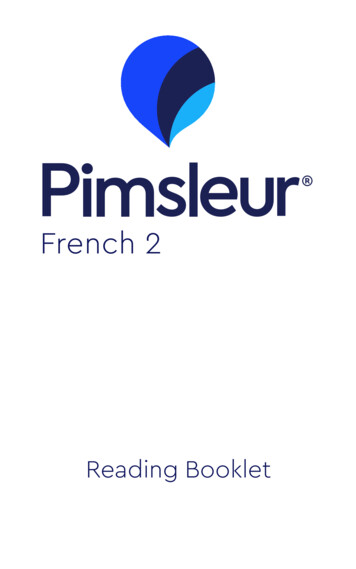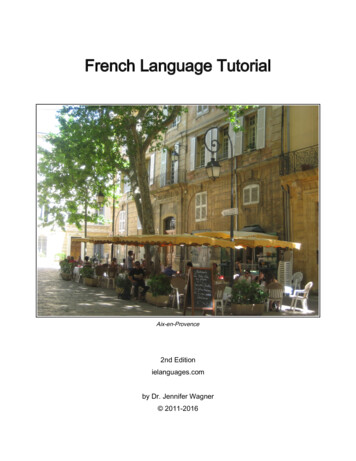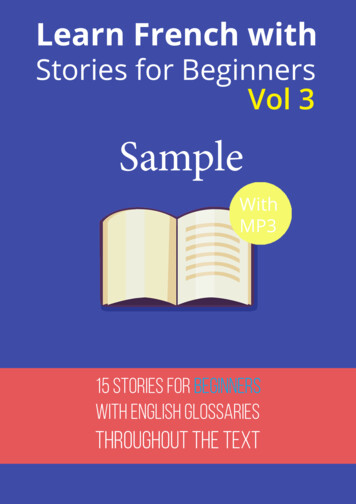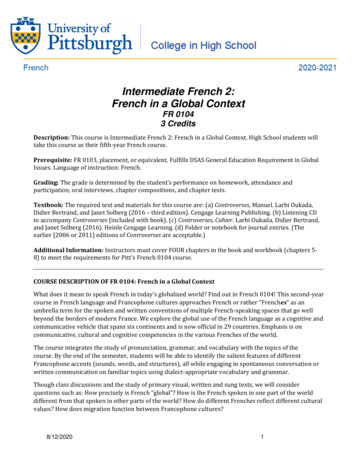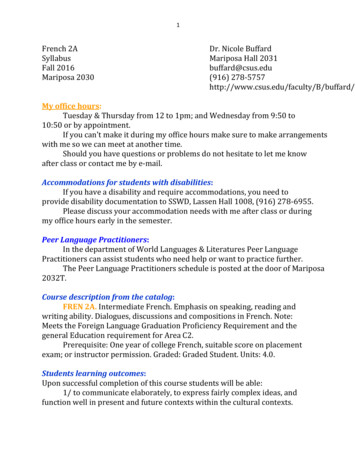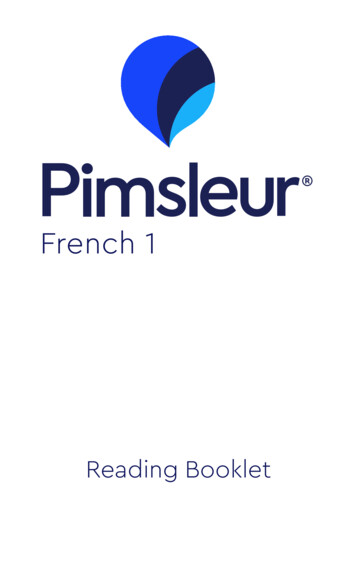
Transcription
CollinsReview booklet
This booklet provides you with a quick and easyway to review and reinforce what you have learnedduring your audio course. The booklet should be usedafter you have begun working through the audio course,as it is not designed to teach you French by itself.
Collins Learn French with Paul NobleHarperCollins PublishersWesterhill RoadBishopbriggsGlasgowG64 2QTwww.collinsdictionary.comFirst published 2010Second edition 2012Reprint 10 9 8 7 6 5 4 3 2 1 0 Paul Noble 2010ISBN 978-0-00-736395-7All rights reserved.Edited by Joe Laredo and Naomi Laredo for Small PrintTypeset by Marc MarazziOther languages in theCollins with Paul Noble series:Spanish, Italian and German
ContentsThe Paul Noble Method5Find out more about Paul, his unique method and why it makes learning Frenchso very easy.How to use this bookletFind out how this booklet can help you as you progress through the course.7Creating French words8This is a light and fun way to begin your French review and expand your vocabularyin French. It shows you how to change various English words into French ones so that,by using this very simple tool, you can quickly develop a French vocabulary of severalthousand words – you will find it requires very little effort or time!Core course reviewHere you can review all the key structures and tenses you learnt during the coursein a quick and easy way.10The past (using “have”)11The past (using “to be”)19The present23The future32Travelling in FranceThis is where you have a chance to use what you have learnt to deal with thoseeveryday situations you are likely to come across when travelling in a Frenchspeaking country.37At the hotel38Eating out39At the tourist office / Asking directions41Taking a train42A brief encounter44Shopping at the market46
Seeing a doctor48Finding a campsite50Taking a taxi51At a café51Taking a bus52Introducing yourself52At the bakery53At the pharmacy53At a glanceHere you will find a snapshot of key verbs, numbers and the French alphabet,to help round off your knowledge of French.Essential verbs: a snapshot54Numbers57The alphabet60Audio track order62
The Paul Noble MethodOver the years, I have taught many, many people. Curiously, they have each had muchthe same story to tell regarding their previous experiences of language learning. As aresult, these days, when I first start a teaching session, I ask my students to raise theirhands if they have had any of the following experiences.Raise your hand, I say: If you studied a language for several years at school but cameout unable to really say anything. If you have ever bought a language course and given up aroundpage thirty, somewhere around chapter two. If you have ever felt more confused by a teacher’s explanation ofthe language than by the language itself. If you have ever been amazed by just how closely grammarbooks resemble furniture assembly instructions. If you have ever felt that you may in fact be more or lessincapable of learning a foreign language.Invariably, all the students soon have at least one hand in the air – and they laugh.They laugh because for some reason our language-learning experiences tend to bevery similar and, sadly, these similar experiences tend not to be very good ones.My own initial experiences of language learning were also uncannily similar to thosedescribed above. In fact, when I ask my students these questions, my own hand is thefirst to go up – and it stays up until we have gone through them all.However, these less-than-positive experiences have had an upside both for myself andfor those individuals I have taught because they, along with a number of other factors,have helped inform and shape the method that will be used during this course.Using this method, you will learn how to communicate in French and how to formulateyour own ideas and thoughts using French.5
The Paul Noble MethodAs you learn with it, you will quickly discover that I do not use complicated grammaticalexplanations at all, and I will not ask you to memorise long lists of vocabulary – the waythe course is structured will by itself ensure that you remember what you are taught.Instead, through your interaction with the audio, I will lead you through the Frenchlanguage, enabling you to build up complex sentences by yourself, step by step, so thatyou are actually speaking independently in French by the end of the course. And this isregardless of how little, or how much, you know when you begin.You will also discover that the language I teach is designed to be adaptable, so thatyou will be able to use it just as easily for holidaying in a French-speaking country asfor living or working in one; it will be just as easy to use it to order a coffee as to holda conversation with the waiter who brings it to you. And, again, all of this regardlessof how little, or how much, you know when you begin.At the time of writing, this method has already proved extremely successful with a verygreat many students, including hundreds of so-called “no-hopers”. Interestingly, notone of these students failed to learn using this method. It is these many success casesand thank-you letters – and even the occasional hug – that have made teachinglanguages so very worthwhile for me and it is this which has persuaded me to publishmy courses here, for the first time.I anticipate and hope that they will be as effective for you as they have been for somany of my other students.Au revoir – and good luck!Paul NobleHead of the Paul Noble Language Institute6
How to use this bookletThis booklet has been designed to provide you with a quick and easy way to reviewand reinforce the key vocabulary, structures and contents of your Paul Noble MethodFrench course.Although the core part of your learning will take place via your use of the accompanyingcourse audio, we have also included this booklet in order to provide you with a quickreference guide to the language, as well as a way to begin to get to grips with bothreading and writing French, should you wish to do so.It is worth noting that this booklet should be used after you have begun workingthrough the accompanying audio. It will serve as excellent reinforcement, guidanceand review material but is not designed to teach you French by itself. This is what theaudio will do – and very rapidly, too. After you have begun working through the audio,you will find this booklet to be an extremely useful review and reference resource, butyou must start by listening to the audio.So, if you haven’t done so already, go and start playing the audio. You are about to findout just how good a course this is!7
Creating French wordsUse these conversion techniques to create several thousand Frenchwords out of English.Words ending in in Englishbecome in FrenchExamplesionstay the sametransformationinformationinvitationagestay the samecagebandagecourageadestay the sameparadebarricadeescapadeudestay the sameattitudegratitudesolitudeurestays the sameagriculturesculpturesignatureible/ablestay the samepossibleterribletableant/entstay the sameimportantintelligentexcellentumstay the samealbummaximumminimum8
Creating French WordsWords ending in in Englishbecome in FrenchExamplesaryaireordinary ordinairesalary salairesolitary solitaireoryoireglory gloirehistory histoirevictory victoireic/icaliquepolitical politiquetypical typiquemagic magiqueididecandid candidestupid stupidetimid timidesmsmeoptimism optimismepacifism pacifismesarcasm sarcasmetytépublicity publicitéactivity activitéquality qualitéoreurdoctor docteuractor acteurpastor pasteurististeartist artistepianist pianistefascist fascisteianien (m) / ienne (f)optician opticienmusician musicienParisian Parisieniveif (m) / ive (f)active actic / activecaptive captif / captivemassive massif / massive9
Core course reviewThe best way to use this part of your booklet is to start by reading through a page,looking at both the English and the French. Then go back to the beginning of thatsame page and, while covering the French side of the text, translate the English intoFrench – just as you did when you listened to the course audio.Once you can get 90% of a page’s content correct, move on to the next page andfollow the process again. By doing this, you will quickly recall and reinforce what youlearnt with the audio tracks.10
The past (using “have”)IJehaveI haveaiJ’aiNOTE! Notice that, as there would be two vowels touching in Je ai,it contracts instead to J’ai – this is a common occurrence in French and one that youwill quickly get used to.visitedthe LouvreI have visited the Louvre.the parkI have visited the park.preparedI have preparedthe coffeeI have prepared the coffee.for youI have prepared the coffee for you.visitéle LouvreJ’ai visité le Louvre.le parcJ’ai visité le parc.préparéJ’ai préparéle caféJ’ai préparé le café.pour vousJ’ai préparé le café pour vous.English words which end in “ion” came into English through French. There are 1250 ofthem. If you know them in English, then you can use them in invitationdécorationIf you take an “ion” word, such as préparation, cut off the “ation” on the end andadd a café “é” in its place, you will have a word like préparé, which means prepared.This means you can now say: I have prepared, I have visited, I have decorated etc. Trythe example below:preparationpréparation11
The Past (using “have”)Now, cut off the “ation”, which leaves you with “prépar”, and then add a café “é”.You will end up with préparé, which means prepared.I have preparedJ’ai préparéI have visiteddecorationI have decoratedthe houseJ’ai visitédécorationJ’ai décoréla maisonNOTE! One of the best things about French, and one way in which it is easier thanEnglish, is that in order to talk about the past, you don’t need to use as many differenttenses as you would in English.For instance, take the following sentences in English: I have decorated the house,I decorated the house, I did decorate the house. In French, these are all expressedin the same way, simply as: I have decorated the house, which in French is:J’ai décoré la maison. The above three sentences can therefore be servedby the same single tense in French.Have a go at this using the following three prompts:I’ve decorated the house.I decorated the house.I did decorate the house.J’ai décoré la maison.J’ai décoré la maison.J’ai décoré la maison.You see, they are all the same! This is excellent news, as it means you don’t need toworry about switching between tenses when talking about events in the past in French.reservationreservedI have reservedI have reserved a table.You have12réservationréservéJ’ai réservéJ’ai réservé une table.Vous avez
The Past (using “have”)You have reserved a table.We haveWe have reserved a table.He hasVous avez réservé une table.Nous avonsNous avons réservé une table.Il aHe has reserved a table.She hasShe has reserved a table.You have (inf.)You have reserved a table. (inf.)They haveThey have reserved a table.They have (female group)They have reserved a table.Il a réservé une table.Elle aElle a réservé une table.Tu asTu as réservé une table.Ils ontIls ont réservé une table.Elles ontElles ont réservé une table.NOTE! As you may have noticed above, there are two words for they in French.Normally, you will use ils for they. However, if you are talking about an entirely, 100%,female group – a group of five women, for example – you should use elles. If the groupis male, or partly male, however, you will use ils – which is more or less the default form.Even if a group contained 99 women and just 1 man, you would still use ils.This is not something to worry or think too much about, though, and if in doubt use ils!13
The Past (using “have”)Asking questions in the pastThere are several ways to ask questions in French. Let’s start by simply inverting theword order, as we do in English.Inverting the word orderYou haveHave you?Have you visited?Did you visit?Vous avezAvez-vous?Avez-vous visité?Avez-vous visité?Notice that the above two phrases are both translated in the same wayin French.Did you visit the Louvre?Yes, I visited the Louvre.Have you visited the park?Have you prepared the coffee?Have you prepared roast beef for dinner?Avez-vous visité le Louvre?Oui, j’ai visité le Louvre.Avez-vous visité le parc?Avez-vous préparé le café?Avez-vous préparé le rosbifpour le dîner?NOTE! Notice how the French use the words for the in French (le/la/les) more thanwe use the in English. You can see this in the above example. Literally: Have youprepared the roast beef for the dinner? The best way to get used to this is simply toremember the French word with the “the” already attached to it and then use it in thatway. So think of dinner not as dîner but as le dîner, and think of roast beef not asrosbif but as le rosbif.Have you decorated the house?Did you decorate the house?Have you reserved a table for dinner?We haveHave we?14Avez-vous décoré la maison?Avez-vous décoré la maison?Avez-vous réservé une tablepour le dîner?Nous avonsAvons-nous?
The Past (using “have”)Have we reserved a table for dinner?Have we visited the Louvre?Avons-nous réservé une tablepour le dîner?Avons-nous visité le Louvre?Using “est-ce que ?”Another way to ask a question in French is to put est-ce que ? (literally: is it that ?)in front of a statement.We have reserved a table.Have we reserved a table?You have decorated the house.Have you decorated the house?Nous avons réservé une table.Est-ce que nous avons réservéune table?Vous avez décoré la maison.Est-ce que vous avez décoréla maison?Using a rising intonationAnother way to ask a question is to use a rising intonation, as we do in English.However, this is used far more frequently in French than it is in English. To ask aquestion this way, simply raise the pitch of your voice at the end of the sentence.Try the examples below. First say the sentence as a statement, and then try again, thistime raising your pitch at the end to change it into a question.He has reserved a table.Has he reserved a table?They have prepared roast beef for dinner.Have they prepared roast beef for dinner?Il a réservé une table.Il a réservé une table?Ils ont préparé le rosbif pourle dîner.Ils ont préparé le rosbif pourle dîner?NOTE! Although a rising intonation is used very frequently in speech in order to ask aquestion in French, it is not normally used in writing. Why? Well, simply because thereader cannot hear you when you raise your pitch at the end of the sentence, can they?So, when writing, use est-ce que ? or invert the word order.15
The Past (using “have”)Using “it” in the pastI have prepared.J’ai préparé.I have prepared it.Je l’ai préparé.NOTE! Notice how, unlike in English, the “it” goes before “have” – not after it.For this, keep in mind the simple rule you learnt during the course: “have” always stealsthe pronouns and places them directly in front of itself. (Pronouns are little words like it,me, you, us, him, her, them.)You have prepared.You prepared it.We have prepared it.to buyboughtWe have bought it.He has bought it.to understandunderstoodHe has understood it.She has understood it.You have understood it. (inf.) 1to eateatenThey have eaten it.They have eaten it. (female group) Vous avez préparé.Vous l’avez préparé.Nous l’avons préparé.acheterachetéNous l’avons acheté.Il l’a acheté.comprendrecomprisIl l’a compris.Elle l’a compris.Tu l’as compris.mangermangéIls l’ont mangé.Elles l’ont mangé.JARGON BUSTER 1Inf. informal (referring here to the tu form of addressused when talking to family, close friends and children).16
The Past (using “have”)Using “some/any” in the pastI have eaten it.Je l’ai mangé.some / some of it / any / any of itI have eaten some of it.to findfoundThey have found it.They have found some of it.He has found some of it.She has found some of it.You have found some of it. (inf.)You have found some of it.Have you found some of it?enJ’en ai mangé.trouvertrouvéIls l’ont trouvé.Ils en ont trouvé.Il en a trouvé.Elle en a trouvé.Tu en as trouvé.Vous en avez trouvé.Est-ce que vous enavez trouvé?Using negatives in the pastI haveI have prepared.I have prepared it.I haven’t prepared it.I didn’t prepare it.You haven’t prepared it.You didn’t prepare it.You didn’t prepare any (of it).You didn’t find it.We didn’t find it.We didn’t find any (of it).to buyboughtWe didn’t buy it.to sellsoldWe didn’t sell it.to seeJ’aiJ’ai préparé.Je l’ai préparé.Je ne l’ai pas préparé.Je ne l’ai pas préparé.Vous ne l’avez pas préparé.Vous ne l’avez pas préparé.Vous n’en avez pas préparé.Vous ne l’avez pas trouvé.Nous ne l’avons pas trouvé.Nous n’en avons pas trouvé.acheterachetéNous ne l’avons pas acheté.vendrevenduNous ne l’avons pas vendu.voir17
The Past (using “have”)seenWe didn’t see it.We didn’t understand it.vuNous ne l’avons pas vu.Nous ne l’avons pas compris.He didn’t understand it.She didn’t understand it.meShe didn’t understand me.They didn’t understand me.to waitwaitedThey didn’t wait for you.They didn’t wait for me.He didn’t wait for me.Il ne l’a pas compris.Elle ne l’a pas compris.meElle ne m’a pas compris.Ils ne m’ont pas compris.attendreattenduIls ne vous ont pas attendu.Ils ne m’ont pas attendu.Il ne m’a pas attendu.18
The past (using “to be”)Sometimes in French, you cannot use “have” for the past tense. Instead, you need touse a form of “to be”. This occurs when you use a verb 2 in the past that involvesgoing or coming in any sense.So, when you are talking about going, coming, arriving, departing, going out, going up,coming down, being born (coming into the world) or dying (going out of the world), youwill use “to be” to form the past tense – not “to have”.Therefore, to say in French that he has gone / he went you will literally say “he is gone”.To say she has arrived / she arrived you will say “she is arrived”. To say he has left / he leftyou will say “he is left”. This is, however, only for verbs that involve going or coming insome sense. 3 Let’s look at an example:I amto arrivearrivedI have arrived.We areWe have arrived.Je suisarriverarrivé / arrivée / arrivés /arrivéesJe suis arrivé / arrivée.Nous sommesNous sommes arrivés /arrivées.Before moving on, it is probably worth explaining why “arrived” is spelt in four differentways above – and sometimes in two different ways in a single sentence!The first point to make is that, when speaking, this spelling difference doesn’t matterbecause all four spellings are pronounced in exactly the same way: arrivé. However, ifyou decide that you wish to learn to write French, you will need to be aware that thespelling for “arrived” changes according to what I like to call “the fiancé rule”.19
The Past (using “to be”) JARGON BUSTER 2What is a verb? An easy way to identify a verb is to see if youcan put “I”, “he” or “we” directly in front of it. If you can,it is a verb. For example: I go, he eats, we fly, I buy, he thinks,we leave. All the underlined words are verbs; you know thisbecause you can put “I”, “he” or “we” directly in frontof them. JARGON BUSTER 3The exception to the ‘coming and going’ rule is rester,meaning to stay. After going or coming somewhere, ofcourse, you would need somewhere to stay, which mayhelp you to remember this.The fiancé ruleYou may well be thinking: what on earth is this? Well, we all know what a fiancé is:a person someone is engaged to. In English, a male person you are engaged to isspelt fiancé. However, a female person you are engaged to is spelt fiancée withan extra “e” on the end.This fiancé/fiancée rule happens to apply to all verbs in French when they are used with“to be” to form the past tense. Let’s look at an example:I have arrived. (said by a man)I have arrived. (said by a woman)Je suis arrivé.Je suis arrivée.You can see how, although it is arrivé for a man who has arrived, it is arrivée fora woman, with an extra “e” on the end. This is just the same as for fiancé/fiancée –fiancé for a man but fiancée, with an extra “e”, for a woman.20
The Past (using “to be”)As stated earlier, however, it is only for this group of “going and coming” verbs (whichuse “to be” to form the past tense) that there is this difference. Normal verbs, whichuse “have” to form the past tense, are the same no matter who they refer to.Take a look:I have eaten. (said by a man)I have eaten. (said by a woman)J’ai mangé.J’ai mangé.You see? They are the same – and they never change!The fiancé rule doesn’t simply stop here, however. In English, if you are engagedto one male person, he is your fiancé. If you’re engaged to one female person, she isyour fiancée. What would happen, however, if you were very naughty and weresimultaneously engaged to two people? Well, it works like anything else in English:you add an “s”.I have one book.I have one male fiancé.I have one female fiancée.but I have two books.but I have two male fiancés.but I have two female fiancées.Now let’s see this in action in French:I have arrived. (said by a man)We have arrived. (said by two men)I have arrived. (said by a woman)We have arrived. (said by two women)Je suis arrivé.Nous sommes arrivés.Je suis arrivée.Nous sommes arrivées.So, if you are familiar with the English word “fiancé”, you now know the fiancé rule andso can write very sophisticated, advanced and, crucially, correct French.The fiancé rule shows you how to write the correct endings, depending on who it isthat has arrived, gone, left etc. Let’s look at this through a series of examples:I have arrived. (said by a man)We have arrived. (said by two men)Je suis arrivé.Nous sommes arrivés.21
The Past (using “to be”)I have arrived. (said by a woman)We have arrived. (said by two women)You areJe suis arrivée.Nous sommes arrivées.Vous êtesYou have arrived. (said to one man)You have arrived. (said to two men)You have arrived. (said to one woman)You have arrived. (said to two women)Vous êtes arrivé.Vous êtes arrivés.Vous êtes arrivée.Vous êtes arrivées.NOTE! Again, be aware that the spelling of “arrived” alters according to who it is thathas arrived and always according to the fiancé rule.Now take a look at these other verbs below and simply apply the rule in exactly thesame way.to gogoneI have gone. (said by a man)I have gone. (said by a woman)We have gone. (said by two men)We have gone. (said by two women)You areYou have gone. (said to one man)You have gone. (said to one woman)You have gone. (said to two men)You have gone. (said to two women)to comecameHe came yesterday.She came this morning.to leaveleftHe left yesterday evening.She left this evening.22allerallé / allée / allés / alléesJe suis allé.Je suis allée.Nous sommes allés.Nous sommes allées.Vous êtesVous êtes allé.Vous êtes allée.Vous êtes allés.Vous êtes allées.venirvenu / venue / venus / venuesIl est venu hier.Elle est venue ce matin.partirparti / partie / partis / partiesIl est parti hier soir.Elle est partie ce soir.
The presentUsing “it is”Words ending in “-ic” and “-ical” in English end in “-ique” in French.typicalexoticpoliticalIt isIt is typical!It is exotic!It is political!It is notIt is not political!It is not exotic!typiqueexotiquepolitiqueC’estC’est typique!C’est exotique!C’est politique!Ce n’est pasCe n’est pas politique!Ce n’est pas exotique!Talking about what you would like to, want to,can and must do“I would like to ”I would likeI would like to prepare the dinner.with youI would like to prepare the dinner with you.I would like to prepare the dinner becauseI’m hungry (I have hunger).Je voudraisJe voudrais préparer le dîner.avec vousJe voudrais préparer le dîneravec vous.Je voudrais préparer le dînerparce queJ’ai faim.NOTE! You will probably remember, from your time with the audio, that the “m”at the end of faim is not clearly pronounced but rather is only touched on nasally.This is because, in general, consonants on the very end of French words are notpronounced unless they are in FoR LuCK.23
The PresentI would like to prepare the coffee becauseI am thirsty (I have thirst).Je voudrais préparer le caféparce queJ’ai soif.NOTE! By contrast, the “f” on the end of soif is pronounced because it is inFoR LuCK.I would like to prepare the coffee for you.I would like to prepare the roast beef for(the) dinner.I would like to reserve a table.I would like to reserve a table for dinner.to knowI would like to knowifI would like to know if it is possible.you wantyou want itI would like to know if you want it.I would like to know if you want some (of it).whyI would like to know why you want some(of it).I would like to know why it is possible.I would like to know why it is not possible.“want”thereI want to go there.24Je voudrais préparer le cafépour vous.Je voudrais préparer le rosbifpour le dîner.Je voudrais réserver une table.Je voudrais réserver une tablepour le dîner.savoirJe voudrais savoirsiJe voudrais savoir si c’estpossible.vous voulezvous le voulezJe voudrais savoir si vousle voulez.Je voudrais savoir si vousen voulez.pourquoiJe voudrais savoir pourquoivous en voulez.Je voudrais savoir pourquoic’est possible.Je voudrais savoir pourquoice n’est pas possible.làJe veux aller là.
The PresentIt is possible (and in fact usual) in French to replace là with y, which alsomeans there. Let’s look at both:to go there (using là)to go there (using y)I want to go there.I want to go there with you.I don’t want to go there.You don’t want to go there. (inf.)He wants to go there.She wants to go there.to eatShe wants to eat.We want to eat.You want to eat.They want to eat.They want to eat. (female group)aller lày allerJe veux y aller.Je veux y aller avec vous.Je ne veux pas y aller.Tu ne veux pas y aller.Il veut y aller.Elle veut y aller.mangerElle veut manger.Nous voulons manger.Vous voulez manger.Ils veulent manger.Elles veulent manger.NOTE! Don’t forget that veulent is pronounced “vurl”. The letters “ent” are silenthere, as they are whenever “ent” comes at the end of a verb that follows “they”.They don’t want to eat.They don’t want to eat it.I want to know why they don’t wantto eat it.I want to know why they don’t wantto eat any of it.Ils ne veulent pas manger.Ils ne veulent pas le manger.Je veux savoir pourquoi ils neveulent pas le manger.Je veux savoir pourquoi ils neveulent pas en manger.“can”I can go there with you.I can go there this evening.I cannot go there this evening.You cannot go there this evening. (inf.)He can go there this evening.Je peux y aller avec vous.Je peux y aller ce soir.Je ne peux pas y aller ce soir.Tu ne peux pas y aller ce soir.Il peut y aller ce soir.25
The PresentHe cannot go there this evening.We can go there this evening.We cannot go there this evening.Il ne peut pas y aller ce soir.Nous pouvons y aller ce soir.Nous ne pouvons pas y allerce soir.We cannot come this evening.Nous ne pouvons pas venirce soir.voirNous ne pouvons pas le voir.Ils ne peuvent pas le voir.Elles ne peuvent pas le voir.Ils ne peuvent pas en voir.to seeWe cannot see it.They cannot see it.They cannot see it. (female group)They cannot see any of it.NOTE! Don’t forget that peuvent is pronounced “perv”. The letters “ent” aresilent here, as they are whenever “ent” comes at the end of a verb that follows “they”.to leaveThey cannot leave.tomorrowThey cannot leave tomorrow.to go outThey cannot go out tomorrow.I would like to know why they cannotgo out tomorrow.to understandThey cannot understand it.They cannot understand me.They cannot understand you.to sellThey cannot sell it.They cannot sell any of it.26partirIls ne peuvent pas partir.demainIls ne peuvent pas partirdemain.sortirIls ne peuvent pas sortirdemain.Je voudrais savoir pourquoi ilsne peuvent pas sortir demain.comprendreIls ne peuvent pas lecomprendre.Ils ne peuvent pas mecomprendre.Ils ne peuvent pas vouscomprendre.vendreIls ne peuvent pas le vendre.Ils ne peuvent pas en vendre.
The Presentto waitto wait for youThey cannot wait for you.attendrevous attendreIls ne peuvent pas vousattendre.to wait for meHe can wait for me.m’attendreIl peut m’attendre.NOTE! Make sure, when pronouncing these verbs that end in “dre”, to pronounce the“dre” very clearly. It is pronounced like the “dra” at the end of the English name “Sandra”.“must”I must go there with you.to prepare the dinnerI must prepare the dinner.to prepare itI must prepare it.You must prepare it. (inf.)She must prepare it.She must find it.We must find it.We must find some (of it).You must buy some (of it).They must buy some (of it).They must buy some (of it). (female group)Je dois y aller avec vous.préparer le dînerJe dois préparer le dîner.le préparerJe dois le préparer.Tu dois le préparer.Elle doit le préparer.Elle doit le trouver.Nous devons le trouver.Nous devons en trouver.Vous devez en acheter.Ils doivent en acheter.Elles doivent en acheter.NOTE! Don’t forget that doivent is pronounced “dwoirve”. The letters “ent” aresilent here, as they are whenever “ent” comes at the end of a verb that follows “they”.27
The PresentThe present tense without “want”, “can”,“must” etc.We will now take a look at the more general present tense in French – the present tensewithout “want”, “can”, “must” etc. By the end of this quick run-through, you will beable to use the vast majority of verbs in the French language, in the present tense, withalmost no difficulty whatsoever. To do this, you need only to follow two verysimple steps.The first step: chop off the “r”! – Verbs ending in “er”To use the present tense with verbs that end in “er” in French, simply chop off the “r”and pronounce the consonant at the end of the word. Let’s take “to think” asan example.to thinkpenserIn order to say I think, he thinks, she thinks etc., simply chop off the “r” from the end ofpenser and you are left with pense (pronounced rather like “ponse” in the Englishword response). Let’s try a few examples:I think / I am thinkingHe thinks / He is thinkingShe thinks / She is thinkingJe penseIl penseElle penseYou see? Having simply chopped off the “r” from penser, we have discovered thepres
Find out more about Paul, his unique method and why it makes learning French so very easy. How to use this booklet 7 Find out how this booklet can help you as you progress through the course. Creating French words 8 This is a light and fun way to begin your French review and expand your vocabulary in French.


